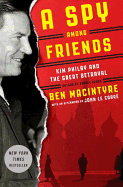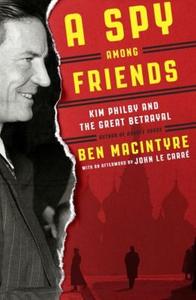

Charming, clever and almost universally liked, Philby rose through the ranks of British intelligence to become head of MI6's office in Washington, D.C. Along the way, he made many close friends in the intelligence community, including CIA counterintelligence head James Jesus Angleton, but none was so close or staunchly supportive of Philby as fellow MI6 agent Nicholas Elliott. Brought together by class and clubs, baptized together by fire and gin, in Elliott's mind the two were as close as brothers. He never for a second suspected his friend Philby was a double agent passing every secret Elliott told him to the U.S.S.R. Macintyre explores the background that left Elliott and so many others vulnerable to Philby's deception, from the loss of a close friend, in Elliott's case, to the more widespread assumption that members of the British upper class had immunity to the lure of communism and treason.
The story seems so far-fetched that only the most overimaginative novelist could have conceived it, and yet it's true. For the first time, Macintyre shines a light not into what happened, but how it could be allowed to happen. Although Philby himself insisted his duplicity stemmed solely from a lifelong devotion to communist ideals, Macintyre paints a different picture entirely, that of a clever sociopath who betrayed hundreds of people to their deaths with no remorse. Even when given the chance to get out of the Soviet ring after narrowly evading discovery, Philby sank immediately back into deception and treason. As readers watch Philby's career progress, an image emerges of a man in love not with Marxism, but with his own ability to lead a double life and never show his true face to those seemingly closest to him.
In addition to Philby's friends, Macintyre profiles other colorful figures who came into contact with him, sometimes with disastrous results, as in the case of Lionel "Buster" Crabb, Britain's most famous frogman. Although the diminutive diver was a middle-aged, depressed alcoholic, his death during a difficult reconnaissance mission was likely due to Philby's influence. Fans of James Bond will enjoy this look into the era that inspired Ian Fleming's novels, but any suspense-loving student of human nature will be shocked and thrilled by this true narrative of deceit. --Jaclyn Fulwood, blogger at Infinite Reads
Shelf Talker: This examination of Kim Philby, one of the most notorious double agents in Cold War history, focuses on the close friends who unwittingly enabled a life of treason.

